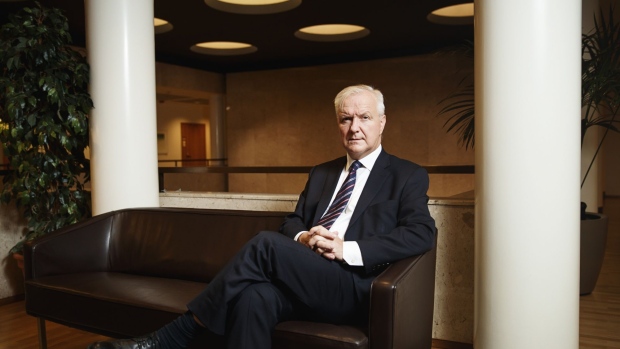Jun 18, 2022
ECB’s Rehn Underscores Commitment to Contain Bond-Market Panic
, Bloomberg News

(Bloomberg) -- The European Central Bank intends to ensure that its monetary policy is transmitted equally across the euro zone’s 19 member-states by preventing undue turbulence on government bond markets, according to Governing Council member Olli Rehn.
“We are firmly committed to contain unwarranted fragmentation that would impair monetary-policy transmission,” Rehn told a panel Saturday hosted by the Federal Reserve Bank of Dallas, stressing that he was “speaking as a member of the Governing Council rather than on its behalf.”
At the same time, Rehn -- a moderate on the interest-rate-setting panel -- addressed concerns that assisting nations struggling with large debt loads amounts to financing their governments. “We are fully committed to preventing fiscal dominance -- and/or financial dominance, for that matter,” he said.
Rehn spoke days after ECB officials sped up work on a tool to combat potential unwarranted deviations in the bonds of euro-area governments. The Governing Council held an emergency meeting Wednesday amid a surge in Italian yields. It’s gearing up to lift interest rates for the first time in more than a decade to curb record inflation.
The announcement of a new instrument has calmed markets somewhat. But investors are eager to hear details of the new instrument and the key now will be how quickly it can be delivered and how convincing it is.
For now, officials can lean on reinvestments of maturing debt from the ECB’s pandemic-era bond-buying program, which can be redirected to support struggling countries. Flexibility in asset purchases “has helped us counter any impaired transmission of monetary policy” and will “firmly remain in our policy toolbox,” Rehn said.
What’s more, “in the case of more profound structural economic weaknesses and debt-sustainability problems, there is always the option to activate Outright Monetary Transactions, which would be preceded by a program of the European Stability Mechanism,” he said, referring to a tool designed a decade ago as ex-ECB President Mario Draghi pledged to do “whatever-it-takes” to save the euro. It was never used.
Plans to start raising rates next month, meanwhile, remain intact. The ECB is “likely to be able to exit negative territory in interest rates by the end of the third quarter,” according to Rehn, who heads Finland’s central bank.
“Trust me that we have both the instruments and -- at least equally important -- the firm will to make sure that euro-zone inflation stabilizes at its 2% target over the medium term,” he said. “Monetary policy cannot do much about rising energy prices, but it can influence inflation expectations to stay anchored around the target.”
©2022 Bloomberg L.P.





